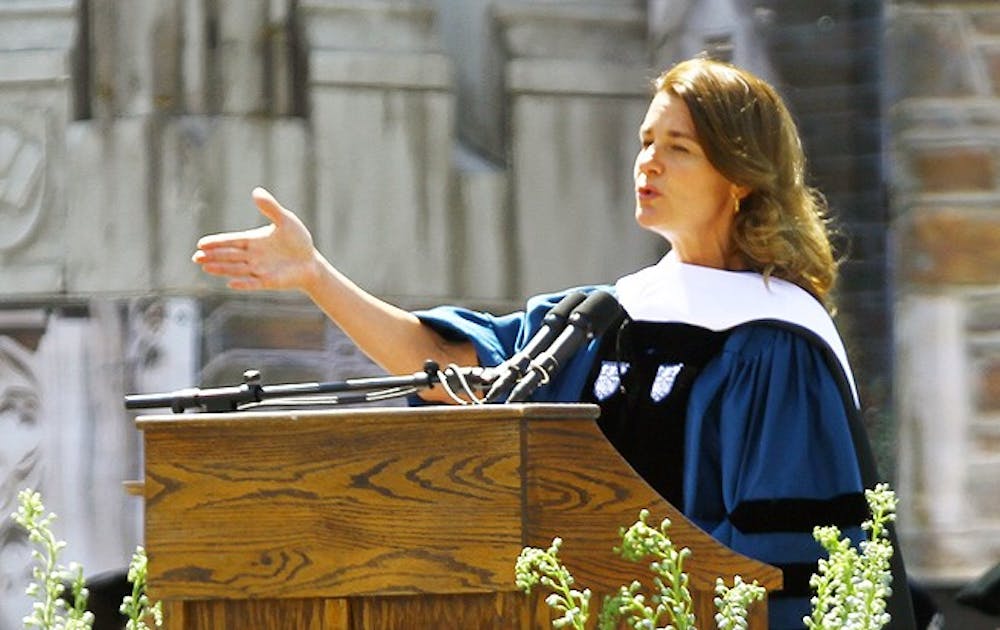Melinda Gates, Trinity ’86 and Fuqua ’87, visited campus last weekend to deliver the commencement speech and receive an honorary degree. A former member of the Board of Trustees, Gates is an entrepreneur and co-chair of the Bill and Melinda Gates Foundation, which aims to improve health outcomes and eliminate poverty in developing countries. Through the years, Gates has helped fund University initiatives such as DukeEngage, University Scholars and the construction of the French Family Science Center. The Chronicle’s Raisa Chowdhury talked to Gates before commencement to discuss her relationship with Duke, her philanthropy and her daily life.
The Chronicle: What are your thoughts so far on being back at Duke this weekend?
Melinda Gates: It’s really fun to see so many students and parents excited about their journey through Duke and so it’s really fun to be back at Duke again.
TC: Why have you maintained a relationship with your alma mater over the year?
MG: Duke is an incredible institution and I was lucky to go here. I got a great education here. For any university to stay on the cutting edge, it requires alums to remain involved with the University. I was on the Board of Trustees and I was also involved through the University Scholars program and DukeEngage.
TC: As an accomplished businesswoman, philanthropist and activist, along with being a mother, how do you balance it all?
MG: For any woman balancing those things it is difficult, so it’s a day-by-day decision and also a week-by-week, month-by-month decision…. I’m super passionate about my family but I’m also passionate about global health. My children are a little bit older now. They’re in elementary, middle and high school now. I’m also lucky that I have great care at home so I can be gone like this and know that they’ll be ok and that’s a nice situation to be in.
TC: How have you found your interests and navigated your path?
MG: Well, Bill and I took our first trip in the fall of 1993 into Africa and we went to see the animals and the savannah, but what really captured us—I mean it was beautiful—but what really captured us were the people. I mean, what’s really going on here? We were in what now is the [Democratic Republic of the Congo], it was Zaire then and there were street blocks...[where] the men would be wearing shoes and the women wouldn’t, and the men would be smoking and the women wouldn’t, and women would have a baby in their belly or on their back and so [I got started] asking questions [about] that. It just led us on a learning journey. How do you create a catalytic change that really affects people’s lives? I’ve made many, many trips around the world sitting down with women and learning what women might need to lift themselves up and their families.
TC: Some students have said that having you here to speak to students, is a “step forward for women at Duke.” Any thoughts on that?
MG: As I travel around the world and I see gender inequity and I see things that women need around the world, it’s really made me ask myself the question—how far have women come in the United States? For me, the answer is not far enough. We need to see more companies headed by women and more philanthropies headed by women. So, part of what I do as a woman is show that Bill and I are equal co-chairs and show that when I think about my daughters in the United States, I want them to be accomplished women. So if I can be a good role model for students I’d like to do that…but that’s not why I took on the speech.
TC: How did you decide how to concentrate your various interests?
MG: One thing you have to understand about the foundation is you have to look at where the most disease and poverty is around the world and where you can be the greatest wedge to affect changes. I go to two northern states in India because that’s where there’s the most poverty and disease [in India] and the foundation is also making progress in Nigeria and Ethiopia. We go where there’s the most need. We also call on governments as well, so when I go to India I also go to Delhi.… I go to Senegal because I really believe in family planning and I’m leading a push for birth control in Africa and they can affect other places in West Africa.
TC: Do you have any advice for students?
MG: My advice is to find what really fires you up. You end up in places that you sometimes never expected you would be and it’s the people you meet. If you stay curious and keep learning, you kind of never know where your passions will take you. For your generation, I hope you really think about how do you make the world equal for all people. Not all students have a chance to go to a place like Duke and if you grow up in a place like India or Bangladesh, your chances are really slim. So how do we make the world more equal so everyone has a chance at equal education?
If students really think about all these amazing tools of technology you have to connect with people around the world, if you meet someone in another place in the world, you can stay connected to them…. If you meet a woman and give her a microloan, you can stay connected with her with things like Kiva and Catapult where people, including me, post great projects that need help.
Get The Chronicle straight to your inbox
Signup for our weekly newsletter. Cancel at any time.

